Tilman Rammstedt, Berlin (D)
Tilman Rammstedt was born in Bielefeld in 1975 and lives in Berlin. Rammstedt was suggested as Ursula März' competition sponsor.
Download text in:
Word file format (*.doc)
PDF file format (*.pdf)
Information on the author
Videoportrait
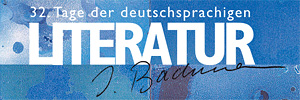
Tilman Rammstedt
The Emperor of China
(Extract from a novel)
That my grandfather was already dead by the time his last postcard reached me, was something I could not know. I had laid it aside unread, just as I had laid the preceding postcards aside unread. Together with the bills and reminders, among which they lurked almost daily, they constituted an ever more daring stack under my desk, which I covered with an old newspaper, even if that wasn't much help, after all I knew what was underneath.
For more than two weeks almost everything had been taking place under the desk. I crawled around on all fours and only entered those parts of the room, that couldn't be seen from outside, my knees padded with kitchen sponges. I slept under the desk, I spread butter on my rolls there, I drew a starry sky on the underside of the table top and waited for the three weeks to pass, so that I could credibly be back from China again, in order somehow to explain, what there was to be explained, an explanation for my grandfather, one for Franziska, one for my brothers and sisters, if they hadn't discovered me before then. I had six days left to think of something, there was no time for postcards, they could wait, and my grandfather too, so I thought, could wait, and then the telephone call came and the waiting had become superfluous.
Naturally I hadn't gone to the phone, I hadn't gone to the phone for fifteen days now, on the answering machine I heard a woman who asked me to return her call, "It's about your grandfather," she said, and even if she added: "It's urgent," I already suspected, that wasn't right, it was about the least urgent thing in the world, I called back, and my grandfather was now a dead grandfather and his postcard was now his last postcard, and I had now become very confused and uncommunicative. "Yes," I said to the woman on the telephone and "No" I said and "Good", although nothing was good, because although I now had one problem less, I had a few new ones instead, and I put down the receiver, took the last postcard from the stack and thought I was sad.
On the front of the postcard was statue of a fat man, sitting in a golden flower on an elephant, the back was covered in my grandfather's tiny, knotty letters, which I had always found difficult to decipher, but which had now, as I ascertained, degenerated into complete illegibility, even with a magnifying glass I couldn't make out any recurring structures, not even narrow down the vowels. Before I gave up I had discovered an "I", a "me" and a "hill" or "hall" or but I couldn't be quite sure.
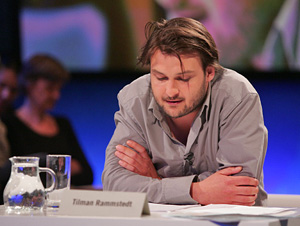
Only the last sentence was clearly written, bigger than the rest and exactly like the address in block letters, carved so deep into the card that they had come through on the elephant on the other side. "You should have come with me." it said, and at the end of the sentence my grandfather had put a big wedge-shaped exclamation mark as well, which was finally supposed to convince me, that this was no polite phrase, no expression of affectionate regret, but of tangible disappointment, a reproach, a threat, and because it was now his last card, it was particularly threatening, as if he wouldn't have died, if I had come with him, as if then he would not have suddenly collapsed in this godforsaken hole, whose exact location I didn't even know, but in China at least, or preferably not at all. If I had come with him, he would only have needed to hold on to me for a moment, "It's nothing, I'm just a little dizzy," he would have said, and I would have led him to a park bench, bought him a bottle of water, because nothing else would have occurred to me, and also because nothing else would have been necessary, "It's all right now," my grandfather would have said after a couple of minutes and taken out his comb, his hair would have been his biggest concern. "You should have come with me," the sentence annoyed me, I heard how he said it, how he stressed the "should have", how his eyebrows arched downwards, how he looked at me after that, as if he expected an answer, the right answer of course: Yes, you're right grandfather, I should have come with you, it was a mistake, you were right again. My grandfather liked to be right, my grandfather had supposedly always known everything beforehand, you should have taken an umbrella, you should have looked at the street map, you should have learned more foreign languages, you should have washed the pullover separately, you should have ordered the steak. My grandfather was always offended, if one hadn't listened to him, but one could never listen to him, because it was only afterwards that he told one all the things one should have done differently, but no one had asked him, and look, now you're wet, and look, now we're lost, and look, now I'm dead.
Yes, I should have gone with him, and no, I hadn't gone with him, not to China and least of all to the godforsaken dumps on the way there, and I knew it looked as if I had let him down, I knew that I, too, owed him an explanation, but now that was no longer necessary, and with the best will in the world I didn't know, whether it was appropriate to be relieved at that.
It was easy to see that the last postcard hadn't come from China either. It bore a German postage stamp, and the picture of the fat golden man had been torn from some travel brochure and roughly stuck onto a free postcard, one corner was already coming away, revealing a polar bear underneath. Almost all the cards, which my grandfather had written to me in the last few weeks, had a picture stuck over them, sometimes not even that, on some there were half-timbered houses and on the printed "Greetings from the Westerwald" the words "the Westerwald" had been crossed out and replaced by a handwritten "Shanghai". Naturally I wasn't very surprised, that my grandfather hadn't reached China in the end, 5000 miles, his car was just too old for that, my grandfather was also just too old for that, and I tried to convince myself, that he had never really intended to go, that he simply hadn't wanted to admit it to himself, that to the end he had just needed someone to whom he had to prove it. Looked at like that, he should even be grateful to me.
China, China of all places, as if there were no North Sea, as if there were no Harz Mountains, no Isle of Rügen, no France, no Lake Garda, it had to be China, China and nothing else. "I don't want to discuss it," my father said, and I said, that's lucky, because I don't want to discuss it either, China was out of the question, and I folded my arms, and my grandfather too, although he only had one arm left, the right one, but he could wrap it so skilfully around his left shirt sleeve, that it looked as if he had two intact folded arms, and then we looked at each other for a long time, my grandfather as determinedly as possible and I as mockingly as possible, in order to show him, what a completely ridiculous idea China was, and then my grandfather said: "I'm dying."
One mustn't make too much of such a sentence, not in retrospect, and not now that my grandfather is in the right yet again either. "Which is why I said, "You're not dying," though that of course would have been a lie in any event, but I simply didn't want to admit that as an argument, I didn't want to be turned into someone, who refuses last wishes, I wanted to remain objective, because objectively I was in the right of course and China was completely impossible, but faced with a dying person, being in the right counts for very little, my grandfather knew that, which is why, to be on the safe side, he had started very early with dying. Because my grandfather was dying for as long as I've known him, longer probably, and he only stopped shortly before his death. In my earliest memories of him he's already looking at me very earnestly and saying: "Soon I won't be here any more," and he points to all the possible things, which I was supposed to inherit after his demise, the oil painting with the two galloping horses, the dagger-like paper-knife, the swivel ashtray, all the things, that one admired then. Years later I discovered that he had also promised the same objects to my brothers and sisters, with the same conspiratorial wink, with the same: "But that remains our little secret." I never brought it up with him, because for one thing painting and paper-knife had long ago lost their charms, for another, it had already become habit to respond to my grandfather's announcements of death with no more than a nod. No one in the family contradicted him any more, no one said: "I'm sure you'll live to be a hundred", because it appeared increasingly likely that he really would live to be a hundred. Every visit to the doctor, always preceded by long leave taking rituals, confirmed anew the almost eerily robust constitution of my grandfather. Until three years ago he still had all his own teeth, until two years ago he only needed reading glasses, and even those he usually put aside out of vanity, despite countless cigarettes and then countless pellets of nicotine gum, lungs and heart still did their duty in exemplary fashion, and it probably wouldn't have surprised anyone, if his left arm had grown on again. But at some point even his body noticed that this state of affairs no longer corresponded to his age, and it made up in a couple of months, what it had previously failed to do. Muscles slackened, arteries became blocked, joints swelled, ears grew. From then on my grandfather had brought back a new medicine from every visit to the doctor; if once half a tablet had lain beside his glass at mealtimes, now the row gradually stretched the whole width of his plate. "Ah yes, my dessert," he said, before he picked them up from the table cloth one at a time with trembling fingers and, grimacing with disgust, swallowed them. My grandfather was always careful to make sure that the rest of us were looking on, that we knew exactly what he was taking upon himself. It was probably intentional that he sometimes dropped a capsule. "Just leave it," he said, if one of us looked for it under the table, made no attempt to bend down himself, and accepted the retrieved pill without a word of thanks.
And basically it was my grandfather's fading health, which was the cause of giving him a trip as a present. "Who knows, how long he'll still be able to travel at all," my eldest brother had said, and nothing better had occurred to the rest of us, a week over Whitsun, one could take a couple of days holiday, together we would get through it somehow, but then first my older sister dropped out, something to do with her little son, and then my second-oldest brother, something to do with an urgent deadline, and since now there wasn't going to be a trip with all the grandchildren anyway, my youngest sister suggested drawing lots, "We don't all have to muck up our holidays," she said, and my matchstick was the shortest, there was no doubt about that, and the other two didn't even try to suppress their relief, my youngest sister even raised a clenched fist for a moment, and my eldest brother slapped me a little too hard on the back. "Chin up," he said, and he probably wanted to say it as encouragement, but it sounded more like an order. Did they think it such a good idea, that I would be the one to go on a trip with our grandfather, I asked, but the others disagreed, "Perhaps it's even best this way," they decided unanimously, "then you'll at last have some time together again," although that was exactly what I feared.
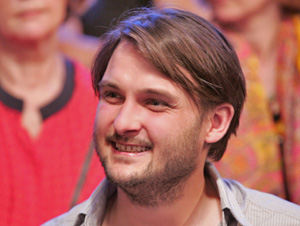
It was impossible to make out, whether my grandfather was pleased with our present. He had studied the voucher without any change in expression and then gone on eating his cake. "Keith is going on a trip with you," explained my second eldest brother, again a little too loud and a little too cheerfully, as he always spoke to my grandfather recently. "We would all have liked to come, but you know how it is," and naturally my grandfather didn't know, how should he, he constantly ran his tongue along his teeth and looked uncomprehendingly at my second eldest brother. "A trip where to?" he asked finally. "Wherever you always wanted to go," said my younger sister, and it would have been better if she hadn't said it. Because the next morning, still in his pyjamas, my grandfather said: "China", and at midday he said it again, and in the evening yet again, and when I showed him travel brochures, Prague, the East Prussian Lakes, Corfu, he didn't even bother looking, "China," he said, "a present is a present," he said, and that he didn't want to discuss it and then one arm was folded and dying brought into play.
"And even if you were to die," I had said, "that would be one more reason, not to travel to China. China is far, China is exhausting, in China no doctor will understand you," and my grandfather had smiled, it was one of his inimitable sad smiles, and he said quietly, that then he would prefer not to go away at all, he hoped I would enjoy myself on Corfu, and pretended to concentrate on his book again, and I remained standing in front of him for longer than I wanted, watched, as he repeatedly raised his index finger to his lips before the unconvincingly frequent turning of the pages, "If you say so," I said, before leaving the room, the house, as quickly as possible, and going as far away as was feasible.
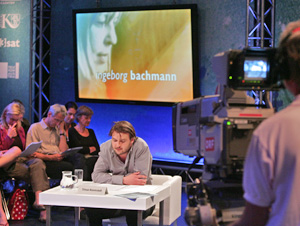
"And where are you going?" Franziska asked me, after I had talked her into coming round that evening after all.
"At any rate not to China," I said.
"That still leaves a few other places," she said and didn't stay the night.
Franziska hadn't stayed the night for six weeks now. "I have to leave," she always said far too early, looked at her mobile phone to check the time, and looked in her bag for her car keys. "Drive carefully," I then said, without wanting to, and she only smiled wearily, and I always closed the front door quietly and only long after the noise of the engine could not be heard any more.
My grandfather had of course never been in China, he had been almost nowhere, as it turned out, he had never left the European continent, never left Germany, had only once got quite close to the Danish border, and once, on a generous interpretation, the Dutch border.
"And why now does it have to be China?" I asked him on the phone the next day. He had called me almost non-stop since eight o'clock, to tell me I had to renew my passport, that I needed sturdy shoes, to ask whether I was vaccinated against malaria.
"My God, you've never even been in Austria," I exclaimed, and my grandfather said nothing, said nothing for a long time, until I asked: "Are you still there?"
"Yes," he said. "I don't want to go to Austria," he said. "I don't have time for Austria any more," he said, and now it was I, who was silent, because yes, when it came down to it, I didn't want to go to Austria either, at least not with my grandfather, when it came down to it, I didn't want to go anywhere with him, not to any mountain, not to any beach, not to any desert, any museum, any thermal spring, I didn't want spend an unnecessary length of time looking through bi-lingual menus with him, be silent beside him at any famous views, I didn't want to say ridiculously early in the evening, that I was exhausted by all the walking, in order to allow no moment, in which we at last had time for one another again, and when it came down to it, perhaps China was the only sensible suggestion, because there bi-lingual menus probably weren't much help, because there in the evening over rice wine one most likely really was exhausted, because there it would be no problem not to understand one another, because one didn't understand everything else either, and most likely there would be too much of everything there, except time for each other, and in the end, at best, one would no longer know what one could have done with the time, everything unspoken between us would have been filled with China, and I remembered again, how as a child I had once believed for a couple of days, that my grandfather was Chinese.
He must have had an argument again with one of my grandmothers, the second or the third, it was very loud at any rate, and at some point he shouted: "And I'm the Emperor of China." At that time his office impressed me less than his origin, and I repeated it everywhere, not everyone believed me. Then why didn't I look like a Chinese, I was asked, and I said: "It'll come," although I had no idea, what Chinese people actually looked like. All look the same, it was said, and I imagined a country, which was just full of my grandfather, in which my grandfather sat behind the wheel of every car, in which my grandfather stepped out of every Chinese house in the morning, said goodbye to my grandfather and took his children, five very small grandfathers, to school. Then a few days later the truth came out. "You're not Chinese," I said to my grandfather. "Whatever you say," he said.
Then I still liked the idea of a country full of grandfathers, but on the telephone it seemed a terrible idea, one was enough for me, one was in fact already one too many, and that was what it was about, and not about China or Corfu or Austria.
"Are you still there?" he asked now, and I said: "Yes, I'm still here," then I put the phone down.
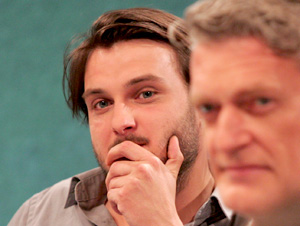
I'm not certain, to how many of my siblings I'm actually related. But it can be assumed, that I have at least one parent in common with most of them. I can remember the birth of my younger sister very well, I was five at the time, and all of us together went to see my mother in the hospital. "There you all are," she exclaimed in a still-weak voice, but later it became clear, that she had to think a long time when it came to the name of my second-eldest brother, and she also constantly looked hesitantly at my sister, as if she wasn't quite sure, whether she had ever seen this girl before.
So I can only assume that the woman in the hospital was my natural mother, and apart from this natural bit we didn't have much to do with one another. Since earliest childhood I had lived with my grandfather, and again I can only assume, that he is my natural grandfather. There's a certain resemblance between him and my mother, the chin, the short fingers, that has to do, he always avoided any further questions. Once when I found a photo, which shows him as a young man, with a girl on his shoulders, I asked him, if that was my mother. He took the photograph, briefly looked at it with narrowed eyes, then gave it back to me and said: "Probably."
There was a great deal that my grandfather considered probable, that there was still some milk, that the summer holidays were coming soon, that in Australia water drains out the wrong way round, but one couldn't really be certain of anything, he liked to instruct us, and when one of us precociously contradicted: "Except that we die," my grandfather said: "That is indeed very probable."
But even there he seemed to sense a small residual possibility, and in recent years, ever since his body started catching up on the appropriate decay, he clung to this residual possibility with a perseverance one could otherwise never have suspected him of having. His ambition, not to die, gradually turned into a full-grown obsession. Several times a month I had to go to the cemetery with him, where he inspected grave after grave and triumphantly exclaimed "Younger," "Much younger," "Almost the same age," and if someone had actually dared to die at an advanced age, he noted down the exact dates, which he then entered on a list above his desk. 72 years 112 days, 79 years 6 days, 83 years 299 days, and every time he had overtaken someone on the list again, when he could cross out a name again, he called us all together. "Congratulations, grandfather," we then said in chorus, and he demurred: "Thank you, but as yet nothing has been achieved."
His late wish, to outlive everyone, gradually assumed alarming forms. Death was not only his enemy, but increasingly also his helper, at breakfast he read out the obituary notices with pleasure, he looked hopefully at every passing ambulance, he developed a suspicious predilection for disaster movies, and one afternoon it was only at the last minute that we could stop him burying my younger sister's tortoise, "It was clinically dead, honest," he maintained, even though its legs were visibly waving in the air in the pit which was hardly more than ankle deep. There were moments in recent years, when we were seriously concerned for our safety. If one of us only coughed, my grandfather was immediately on the alert: "That really doesn't sound good at all," and the undertone in his voice was not one of concern. I'm not sure if I only imagined all of it, but the incidents mounted up. He constantly topped up my eldest brother's glass of wine, even when the latter had repeatedly stressed, that he still had to drive, my older sister told us of conspicuous scratches on the flex of her hair-dryer, and a few months ago, when I was carrying a crate of water I had just bought down to the cellar my grandfather switched off the light when I was still half way down the steep flight of steps. "Sorry," he said, when I promptly complained, but nevertheless did not switch the light on again.
At about this time my grandfather also began accusing my siblings and myself of trying to finish him off. There constantly seemed to be something wrong with his medication, butter was constantly being mixed with his food all the time, although he had to pay attention to his cholesterol level, someone was supposedly constantly opening windows, so that he would catch his death of cold. "But you won't catch me, my dears," he said then. "You won't catch me."
Of course my grandfather knew, that very probably he was not immortal and never would be, despite all his efforts and precautions. I suspect, that he steadfastly hoped to be forgotten by death once he had passed a certain age. As one hopes to be forgotten by the telephone company, after one has ignored all the reminders and the connection simply goes on working, because nobody knows, that it's still there at all.
And indeed it's hard to grasp, that he really is dead now, that his life has absolutely come to an end, because otherwise he couldn't end anything. Earlier, when there were still grandmothers, some of the appropriate age, some only a few years older than we were, they had repeatedly exhorted him, one after the other in almost identical words, in heaven's name for once to finally finish something, the tax statement, the pergola which for years had been unintentionally two-tone, the jigsaw puzzle on the living room table, which we didn't even notice any more.
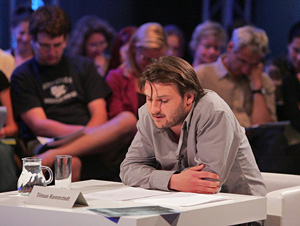
At that my grandfather always nodded understandingly, sorted out a couple of invoices or added a jigsaw piece, then he quickly looked for a new task, the furred-up coffee machine, the tangled telephone flex, cards for birthdays which were far from imminent, anything of which he could maintain, it really was more urgent.
And because of course my grandfather never finished these new activities either and as an excuse had to look for even newer ones, the whole house, my grandfather's whole life consisted of beginnings, everywhere one stumbled on books lying open, half-eaten rolls, odd shoes, listened to stories which broke off mid-sentence, even in the middle of a word, the names of almost all past grandmothers were still on our letter box, and sometimes, when he had said, that he was now going to sleep, one came across him half an hour later standing in the middle of the hall, "I'm on my way," he would then say quickly.
I had told him that it was simply and touchingly crazy to want to drive to China in the car, but my grandfather didn't want to hear any of it, he hadn't reached eighty years of age, to be wrecked somewhere in Siberia with a useless life jacket on his body. The motor car, he maintained, had been proven to be the safest of all means of transport, and the distance was surely not that great. "5,000 miles," I said, "as the crow flies." "There you see," said my grandfather, and from then on it was better not to contradict him. There was ever more panic flickering in his eyes in recent years, when he suspected he might be wrong, and there was something ever more swiftly cold and rigid in his gaze, so that none of us dared look straight at him. He never really became violent, only rarely was crockery smashed, and probably to avoid something worse he wrapped his left arm several times around his right sleeve, and we left the room as quickly as possible.
Usually "grandfather's moods", as we soothingly called them, were followed by long phases of silence, of staring into mid-air, of immobility. He sat slumped in his easy chair and answered our cautious questions, if at all, with a "Hm" which one could only interpret according to the pitch as disapproval or agreement. On such days he didn't join us at mealtimes, and what was passed off as remorse, was in the first instance intended to arouse our pity. "You have to eat something," we then said readily and showed concern, although there were sufficient signs, that as soon as we were out of sight, he made sandwiches or took our left-overs.
My grandfather never cooked himself, but if a visitor praised the food, he was always quick to say "Thank you", and if one took it up with him later, he said he meant to speak for all of us. But apart from that my grandfather was like a changed man in the company of other people; he still talked a lot, but more quietly than usual, and usually it even had to do with the topic that was being talked about, he asked questions and waited for the answers, he laughed sincerely, even at other people's jokes, he didn't inquire hypocritically, whether one "had finished eating," before lunging over the table with his fork and helping himself from our plates. One even had to admit, for better or worse, that he was charming, at least if there were young ladies among the guests, and in particular young ladies whom I had invited.
My grandfather was such a charming man, was something I had to listen to often enough, how entertaining he was, was something I had to listen to, youthful, attentive and a gentleman, was something I had to listen to, sometimes even sexy. When these young women came again, then the place already smelt of my grandfather's eau de cologne in the afternoon, then he often changed his shirt several times, then he had sometimes even got small gifts for them, a stone, a book, possibly a brooch. If the young women visited more often, then my grandfather missed no opportunity to make me look ridiculous in front of them, it started with harmless childhood stories, continued by way of unflattering photographs to strange strings of lies, that now and then I still wet my bed, for example, or that as a child I had noticeably often worn the clothes of my older sisters. It could happen that, on what had been planned as a romantic meeting at the cinema or in a cafe, suddenly my grandfather was sitting beside us, he had encountered us apparently by chance, but the only explanation was that he had been eavesdropping on my telephone conversations or had secretly followed me. My manoeuvres to distract him had to become ever more ingenious, I muttered ever more inaudibly on the telephone, I looked round ever more nervously at romantic meetings, so that they were often the last meetings.
Little wonder, that at some point I stopped bringing young women home at all, that I kept any closer acquaintanceship with them a secret, which only had the result, that my grandfather thought I was suffering from loneliness and constantly wanted to do things with me. "Today we're going out, just you and me, as we used to," he decided, and I was to pick a bar, a "scene bar" as he specified, and out of defiance I then always took him to "Pete's Metal Corner" where, visibly intimidated, he drank some beer out of the bottle and after every mouthful examined the label for a long time. Then at some point, out of pity, I shouted "I'm tired," against the music, and he nodded in relief.
But then on the way home he was very elated. How nice such an evening with just the two of us was, he would say, "Yes, grandfather," that one finally had time to talk, "As you say, grandfather," that I should bring one of my girls home again, "There isn't a girl at the moment, grandfather," that I could always ask his advice about such things, "Thanks, grandfather," that he thought, when it came to women, we had more or the less the same taste, "That's quite possible, grandfather". Just how possible it was, we could then not yet suspect. Franziska didn't become my grandmother until three years later, not until four and a half years later did she become my wife, and that now, six weeks ago, she had become someone, who always had to leave far too early, was something I never told my grandfather, because he might perhaps have been able to hide his satisfaction, but probably not his sympathy.
Even the postmark on my grandfather's last postcard was illegible. A postal centre which would anyway not mean anything to me, a date, the 18th or 19th, but even that was not what mattered any more, at that point he had certainly still been alive and he was certainly no longer alive now, and just as certainly he could not have known that, there was, therefore, nothing to suggest, that anything more significant was communicated on the card than on the countless others. Always postcards. Earlier, too, when I was still living in the house, he put them unfranked in our postbox, in order then to bring them to the breakfast table for me with a triumphant "Post for you, Keith." After I moved into the garden house their number increased, sometimes they were waiting for me several times a week, now sent properly by post, although of course it would have been much simpler to take them round personally, but we had tacitly agreed to regard the few yards between us as a distance which had to be taken seriously.
But it wasn't just the cards which in my siblings' eyes gave me the dubious reputation of a "golden boy". They called me "grandfather's favourite", "son and heir" and "apple of his eye". To me the preferential treatment over the years had mostly been an embarrassment. Previously our relations had been governed by a kind of doctrinaire justice, which had called for so many tables, so many compensation payments, so many measuring tapes and scales and stop watches, that it is unclear whether my grandfather finally summoned us to one of the "family meetings", which were still regularly held then, out of resignation or for a genuine rethink. He explained to us, that unfortunately he didn't have enough energy to devote himself equally to all of us, which was why he had decided to concern himself with me above all, so that in the end he wouldn't just be left with mediocrity. "But that doesn't mean, that I don't love you all equally," he emphasised, and we had to swear that we believed him. From then on he took me for a little excursion every weekend, to the zoo, to the natural history museum, to seemingly endless piano recitals, and then at supper talked at length about our experiences, while I stared silently at my plate, carefully avoiding my siblings' glances.
Later came the walks, "You're something very special", "Something will come of you," "You won't disappoint me, Keith, I just know it". At eight, when I wanted to be an astronaut, he gave me a telescope, at ten when I wanted to be a secret agent, he let me learn various martial arts and together we built hidden bugging devices into my siblings' rooms, then at thirteen when I wanted to be a film star, he dragged me from casting session to casting session, in a TV series which ended long ago, I run down a street with other children, that was my only appearance. "You run the best, no doubt about it," said my grandfather, but by then it was no longer so important to me.
By the time I was fourteen, I didn't want to be anything any more, and my grandfather chose my passions for me. Architecture, pyrotechnics, "something with computers," the unread books on these subjects fill whole shelves of the bookcases. "You are very versatile in your interests," decided my grandfather, and I didn't contradict him.
Of all these special favours, however, the postcards remained the most embarrassing, especially in the final few years, when my grandfather had good reason not to send me any more, when we almost only spoke in passing and muttered to one another, when the phone at the other end was put down ever more frequently, when Franziska answered.
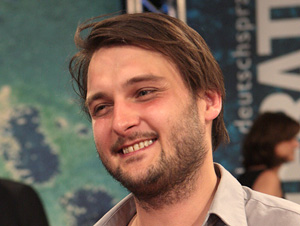
Sometimes I thanked him for the postcards, but I never sent him one myself, I tried again and again, again and again I wrote "Dear Grandfather", sometimes also "Many thanks for your postcard", but that was as far as it got, nothing suggested itself as the next sentence, nothing seemed worth communicating, and the postcards I had begun to write piled up in my drawer, many already addressed, some already provided with a postage stamp, whose value or currency was no longer valid. I don't know why I never threw the cards away, perhaps I thought it was a waste, they were hardly used after all, perhaps I just didn't want to admit my failure, that in all these years I had not once succeeded in sending him a couple of inconsequential sentences, so that I convinced myself, there simply wasn't enough space on a postcard for what I thought I wanted to tell him, even if I didn't exactly know, what that was and how much space would have been appropriate for it.
And now, when all the space in the world would presumably not be enough, because apart from the postage stamp the addressee was no longer valid either, I took one of the postcards I had started out of the drawer.
Dear Grandfather,
was already written there, presumably in the hope that the salutation itself would fill a large part of the supposedly insufficient space, which didn't help much because a good four fifths of the card was still empty. And suddenly I no longer wished to tolerate this empty state, and suddenly it seemed to me more than a failure, because perhaps the space had always been sufficient, perhaps it had even always been too big, perhaps there had in fact never been more to say, than "Dear grandfather, perhaps even the "Dear" would have been a bit much, and perhaps I should have sent all the cards as they were, because that at least would have corresponded to the given facts, but now I had to deal with other given facts, with final, with tangible facts and I took a pen and under the salutation I wrote
you are dead.
My handwriting had hardly changed in the years between the two lines, then I had used a black ball point, now a blue one, other differences were not visible. Then I wrote.
Best wishes
Your grandson
Keith
and still almost half of the space on the card was available. For a long time I stared at the eight new words, there weren't going to be any more. I took a pair of scissors, cut the card just under my name, then I posted it.
Translated by Martin Chalmers

